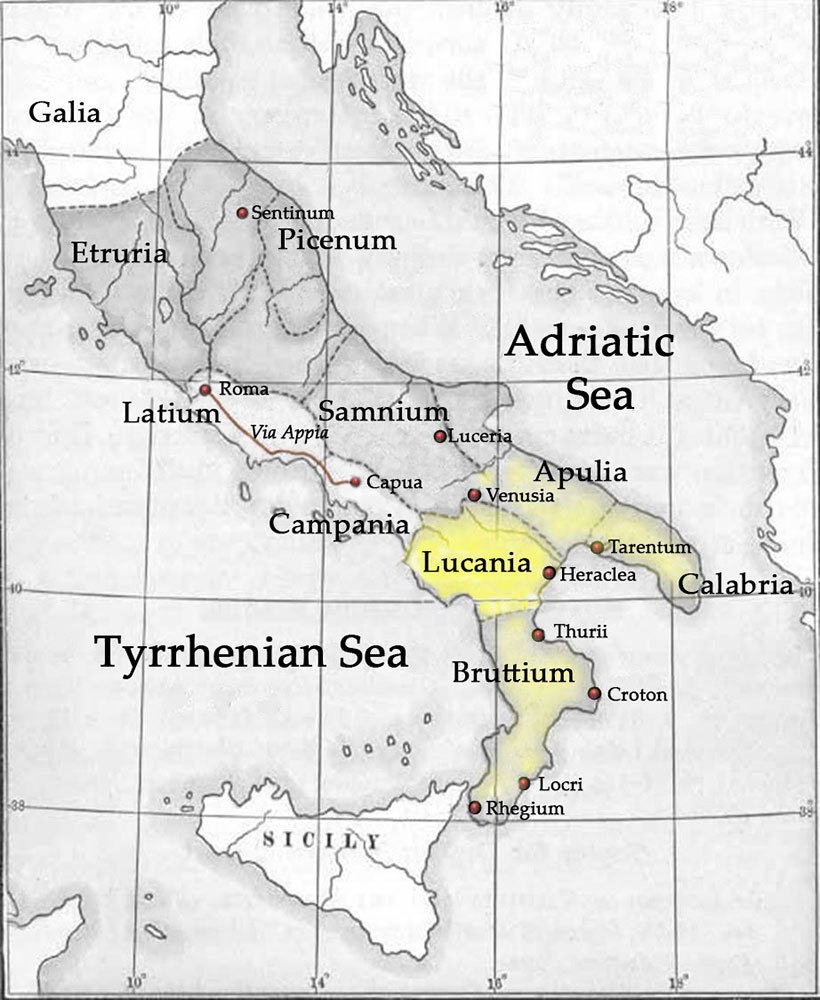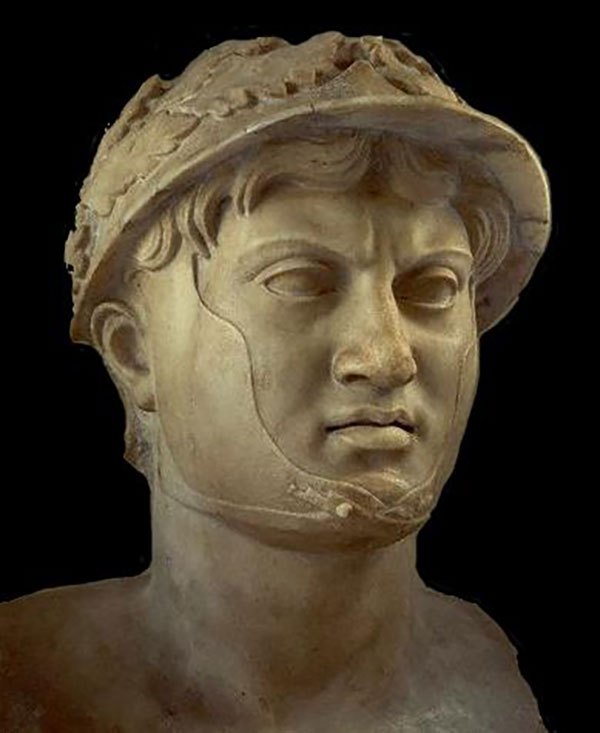281-272 BC
Lead up to the war with Pyrrhus
281 BC
The Romans defeated the Gauls (Boii) and Etruscans in the north (battle of Lake Vadimon) and absorbed Sabine lands to the east. They now had the resources to resolve the situation to the south of the Italian peninsula. They would need those resources because the Samnites were once again in armed rebellion against Rome.
The excuse for Roman involvement in the south has to do with the internal politics of the various city states as well as the international distribution of power.
Run-up to the Pyrrhic War–Rome Intervenes in the South
The political situation in the south of Italy lent itself to Roman intervention. Weak Greek city states, such as Thurii, were threatened by their stronger neighbors. Having no option, they turned to Rome for protection. Often, the Romans would send a garrison to protect the city and diplomatically warn off an aggressive opponent. This volatile situation inevitably resulted in armed conflict.
E. T. Salmon, Samnium and the Samnites, 1967, pages 280-292.
Weaker city states, such as Thurii, would be threatened by stronger peoples, such as the Lucani or the Tarentines. Depending upon which faction controlled the city state at a given moment, the Thurii would either submit to the local power or appeal to Rome for protection. Neither was a desirable choice for the weaker city state, but one of these choices was considered the lesser of two evils. Consequently, several of the weaker city states in Magna Graecia eventually housed Roman garrisons. This only served to increase the tension, especially with the shifting internal politics within the various city states that might bring different factions to power and those factions might favor different alliances with different powers.
The Romans and Tarentines have a falling out
Thurii, appeals to Rome for help against the Lucanii. Rome responds by placing garrisons in Thurii and in various nearby cities. Tarentum (the Greeks called it Taras), the dominant sea power in the region, has a treaty with Rome which forbids a Roman naval presence in the Gulf of Taranto. A Roman fleet, commanded by Admiral Lucius Valerius, is delivering a garrison to Thurii when it is blown off course by a storm. Consequently, 10 ships of the fleet sail into the harbor at Tarentum on the festival of Dionysus. The Tarentines see this as a hostile act and attack the fleet, sinking 4 vessels and capturing a fifth. The Tarentines then send troops and a fleet to Thurii, help the Democratic faction there overthrow the Aristocratic rulers and force the Roman garrison to withdraw. Rome sends a diplomatic mission to Tarentum demanding a redress of grievances but Philonides, a member of the Tarentine Democratic party, insults Postumius, the Roman ambassador. As a result, the Senate declares war. The Tarentines appeal to Pyrrhus of Epirus for aid against the Romans.
Pyrrhus of Epirus
A relative of Alexander the Great, Pyrrhus was a gifted military tactician and an effective commander of the Macedonian system of fighting. He was invited by the Tarentines to check Roman expansion into Magna Graecia. He defeated the Romans in two key battles. He then marched to Sicily to fight the Carthaginians, against whom he was also successful. His methods, however, eventually alienated his allies and he left Italy, commenting that he was leaving Italy and Sicily to the Carthaginians and Romans.
Roman legions under the command of Lucius Aemilius Barbula enter Tarentum and plunder it. The Tarentines, along with Samnite and Salentinian reinforcements, fight a land battle, which they lose. They sue for peace and begin talks when 3,000 Epirote troops under the command of Cineas enter Tarentum. Talks are broken off. The Roman consul is forced to withdraw and suffers losses from an attack by the Tarentine navy.
Pyrrhus’ Strategic Considerations
Pyrrhus is obliged to help the Tarentines because they helped him conquer Corcyra. He also needs troops for a campaign against Macedonia but hasn’t the funds. His thinking is to help the Tarentines against the Romans, enlist the Samnites, Lucanians, Brutti and Illyrians in the process, then defeat the Carthaginians in Sicily. Such a successful campaign would give him the funds, the manpower and fleet to complete the conquest of Macedonia.


